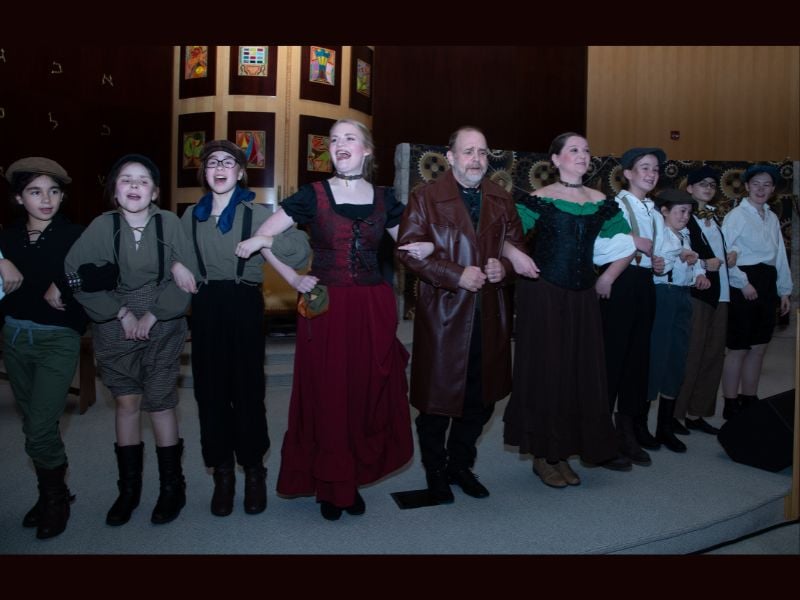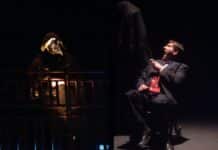For a decade, Theatre@CBT at Congregation B’nai Tzedek in Potomac has produced musicals for the enjoyment and edification of families, friends, and the wider DC area. The final show of their tenth season is Lionel Bart’s Oliver! — a solid choice as a family show with a Jewish connection.
Oliver! is the product of two worlds, both of them somewhat removed from our own. The first is the original 1837-8 Dickens novel, and the second is 1960s Broadway. Oliver Twist, or the Parish Boy’s Progress was the first of Dickens’ great social consciousness novels, drawing on his own experiences to criticize the misery of children in poverty during the Industrial Revolution and satirize those who created it. It presents a young boy, Oliver Twist, who begins life in a workhouse before being sold to an undertaker, escaping and joining a gang of young pickpockets run by an evil fence, and then serendipitously finding his long-lost family and retiring to a comfortable country life in an improbably happy ending.

The first problem presented by the book is that the head of the criminal gang, Fagin, is referred to as “the Jew” throughout the first 38 chapters, and painted in the most satanic terms. This has led to charges of antisemitism against the usually progressive Dickens. It turns out, however, that Dickens did not mean to smear all Jewish people with his portrayal but based the character on a real criminal from the time, “Ikey Solomon.” Nevertheless, while the novel was still being published in monthly installments, a lady friend wrote to the author to decry his “vile prejudice” and the harm to the Jewish people done by the portrayal of Fagin. Dickens took her message to heart and, for the remaining 15 chapters, barely referenced Fagin’s religion at all. Still, the character has come down to us as one of the most heinous portraits of a Jew in English literature.
Oliver! creator Lionel Bart, Jewish himself, tackled the problem by making Fagin a sympathetic, almost fatherly scoundrel and giving him funny songs that make a feature of his heritage, like “Reviewing the Situation,” with lines and melodies that would fit right in Fiddler on the Roof four years later.
Bart is somewhat less successful dealing with the story’s second problem, the portrayal of women. First, we meet Widow Corney (gamely played here by Lauren-Nicole Gabel) fake-protesting “I Shall Scream” when the Beadle Mr. Bumble (Michael Abendshein) puts the moves on her. This kind of “no-means-yes-but-only-if-you-marry-me” coyness causes us to cringe in the modern era. Similarly, in the novel, Dickens was criticized for making Nancy, a woman of the streets and member of Fagin’s gang, too sympathetic and noble when he was trying to show the dire straits that poverty could lead women into. The musical, too, seems to try to sweeten up her story too much. Her famous number “As Long as He Needs Me” — in its swelling romantic music and lines like “I’ll love him right or wrong…. I won’t betray his trust…Though people say I must” — glorifies her love for the vile Bill Sikes (who eventually bludgeons her to death). With our modern outrage toward domestic violence, the song now reads as a textbook case of Stockholm Syndrome experienced by women in abusive relationships, not tragic devotion to be celebrated.
Oliver! is a classic, however, and Theatre@CBT’s production dives into it with enthusiasm. As always, their stage is the Bima of the Sanctuary in the synagogue, which limits entrances, exits, scenery, and lighting. But the CBT creative team, led by co-directors Michael Abenshein and Arielle Katz, does well making do with what they have. Melissa Yunes’ costumes and the one backdrop have a dark Steampunk flair, which lends them cohesiveness beyond the usual pseudo-Victorian style of such productions, as well as touching on the gear-grinding effect of the Industrial Revolution that gave rise to such misery. The set pieces and properties (by Larry Issadore and Nancy Carlin) are very basic — benches, a chair, and some painted-stone boxes — except for the startling addition of a genuine satin-lined coffin in the undertaker scene.

Music director Aaron Simmons and assistant Paul Rossen do justice to the score, bringing lively accompaniment from the eight-piece orchestra, which balances the chorus and supports the individual singers well (although Matthew Datcher’s usually capable sound cut out a few times on individual mics). One highlight is the lovely “Who Will Buy,” where Oliver’s solo is enhanced by the lilting counterpoint of a quartet of street sellers (Margo Weill, Sari Gabel, Lauren-Nicole Gabel, Michael Abendshein).
May Kesler’s choreography is complicated enough to be a challenge for the company and interesting to the audience. It is carried off enthusiastically by the Adult Ensemble (Len Breslow, Charlie [Sadie] Cohen, Sari Gabel, Allison Ganzhorn, Bruce Rosenberg, MollyBeth Rushfield, Tom Schiller, Margo Weill, and Colleen Williams) and especially by Fagin’s Gang (Jessa Gabel, Andrea Sanger, Elena Sanger, Emma Lipworth, Jordanna Maarec, Mai Miller, Lila Mosier, Jackie Williams, Dani Yunes, Laila Yunes, and Sydney Yunes) and the Kid’s Ensemble (Talia Bender, Orly Echerman, Ethan Ganzhorn, Alex Lipworth, Aya Miller, Gabe Winoker, and Reese Katz). Some of the elements of the dances are a little perplexing, such as two women waving a piece of blue fabric, which they then proceed to fold (is it meant to be water? laundry?), or characters dancing with red fans or parasols (where did a street gang get those?). These seemingly random elements arise, in a sense, from the nature of the show, for a large chunk in the middle of the libretto consists of a bunch of numbers very loosely related either to the plot or to each other. While “Pick a Pocket or Two” and “It’s a Fine Life” deal with the gang’s shady profession and Nancy’s sarcastic enthusiasm for crime and poverty, respectively, “I’d Do Anything,” “Be Back Soon,” “Oom-Pah-Pah,” and the way too long “Consider Yourself” — although they are nicely done and some of the most beloved songs in the show — seem to interrupt the story with forced cheer. But one inspired choreographic choice is to replace a dance break in “Consider Yourself” with a kind of impromptu circus, with spinning hoops, ribbons, and the irrepressible Artful Dodger (Jessa Gabel on Saturday night) artfully spinning poi (weights on flexible cables). This is impressive enough to feel like an enhancement rather than just an extension of the number.
While the chorus is clearly enjoying itself, the principals rise to a higher level. Colleen Williams and Margo Weill have nasty fun as Mr. and Mrs. Sowerberry, the undertakers, singing “That’s Your Funeral.”
Rob Milanic, a CBT stalwart, shows a very different side as a truly terrifying Bill Sikes. Unfortunately, the low voice part doesn’t do justice to his usually soaring tenor, and the character is written as such an unmitigated monster that it is impossible to comprehend how Nancy could ever fall in love with him.
As Nancy, Clare Anderson creates a well-rounded character, showing mixed emotions even in the relentlessly cheerful double-entendre song “Oom-Pah-Pah.” Her awareness of how she is trapped by her love for Bill and later her dawning realization of her love for Oliver in “As Long as He Needs Me” are truly moving.
Fagin, as he is meant to be, is the most interesting and funniest character in the show, and Jeffery Hall plays him to the hilt. His fine voice, amusing asides, little bits of business as he gets “fooled” by the gang in “Pick a Pocket or Two,” and his confused musings in “Reviewing the Situation” are delightful. In addition, his fatherly feeling for Oliver comes naturally offstage as well as on!
As the title character, Evie Hall brings a clear, bright voice, touching acting, and sincerity that are perfect for the role.
There are some awkwardnesses in the production — the ending scenes, especially, seem filled with strange pauses, as if the actors are waiting for a cue in the music to make their next move during what should be a sustained rush to the climax. And then, although it is nice to see Oliver get his family and Fagin go off with the Artful Dodger to their next adventure, the fitful timing makes it feel somehow anticlimactic. But overall, whatever the Theatre@CBT production of Oliver! lacks in polish, it makes up in heart.
Here’s to the next ten years.
Running Time: Approximately two and a half hours with one intermission.
Oliver! played on Saturday, February 8, and Sunday, February 9, 2025, presented by Theatre@CBT performing at Congregation B’nai Tzedek, 10621 South Glen Road, Potomac, MD. Information on future productions is available on the web or on Facebook.



